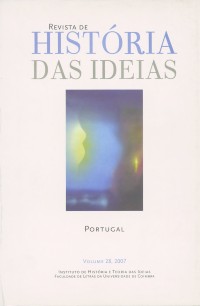Please use this identifier to cite or link to this item:
https://hdl.handle.net/10316.2/41632| DC Field | Value | Language |
|---|---|---|
| dc.contributor.author | Barbosa, Márcio | - |
| dc.date.accessioned | 2017-05-06T23:08:09Z | |
| dc.date.accessioned | 2020-09-30T11:26:12Z | - |
| dc.date.available | 2017-05-06T23:08:09Z | |
| dc.date.available | 2020-09-30T11:26:12Z | - |
| dc.date.issued | 2007 | - |
| dc.identifier.issn | 0870-0958 | - |
| dc.identifier.issn | 2183-8925 (digital) | - |
| dc.identifier.uri | https://hdl.handle.net/10316.2/41632 | - |
| dc.description.abstract | Circunstância comum na história, as personalidades mais marcantes e que, de alguma forma, foram "protagonistas", são especialmente propícias a interpretações ambíguas ou comuns. O presente estudo visa, precisamente, analisar, em profundidade, o pensamento de um homem que quis ser, e foi efectivamente, um protagonista - António de Spínola. Como o título denuncia, procuraremos perceber qual era, para o Governador da Guiné e seu Comandante-Chefe entre 1968-73, o lugar de Portugal (que Portugal?) no Mundo (que Mundo?). Partindo da sua ideia da Nação Portuguesa, a "Grande Nação Portuguesa", primeiro vértice da problemática, completaremos o trígono com o seu desenho do contexto internacional da época e com o problema ultramarino português, o vértice mais agudo. No sentido de se perceber as posições, fluxos e influxos entre os três vértices da questão no pensamento spinolista. | por |
| dc.description.abstract | It is a common fact that history's "protagonists", i.e., those figures who have made a difference in their own times, lend themselves to ambiguous and common interpretations. The present study has the specific intention of providing an in-depth analysis of the thought of António de Spinola, a man who set out - and indeed turned out - to be one such protagonist. As stated in the title, the study intends to clarify what the man who was both Governor and Chief Commander of Portuguese Guinea between 1968 and 1973 viewed to be Portugal's (what Portugal?) position in the world (what World?). Beginning with his concept of the Portuguese Nation, - "The Great Portuguese Nation", which is the first angle of this whole issue -, we shall complete our triangular approach with his depiction of the international scene at the time and with the most acute angle of all, Portugal's overseas problem. We do this in order to try to understand the relative positions as well as the interchanges between the three sides of the issue in Spinola's thought. | eng |
| dc.language.iso | por | - |
| dc.publisher | Imprensa da Universidade de Coimbra | - |
| dc.rights | open access | - |
| dc.title | Spínola, Portugal e o mundo: pensamento e acção política nos anos da Guiné: 1968-73 | por |
| dc.title.alternative | Spinola, Portugal and the world: political thought and action in the Guinea years: 1968-73 | por |
| dc.type | article | - |
| uc.publication.collection | Revista de História das Ideias vol. 28 | - |
| uc.publication.firstPage | 391 | - |
| uc.publication.lastPage | 427 | - |
| uc.publication.location | Coimbra | - |
| uc.publication.journalTitle | Revista de História das Ideias | - |
| uc.publication.volume | 28 | por |
| dc.identifier.doi | 10.14195/2183-8925_28_16 | - |
| uc.publication.orderno | 17 | - |
| uc.publication.area | Artes e Humanidades | - |
| uc.publication.manifest | https://dl.uc.pt/json/iiif/10316.2/41632/248329/manifest?manifest=/json/iiif/10316.2/41632/248329/manifest | - |
| uc.publication.thumbnail | https://dl.uc.pt/retrieve/11858614 | - |
| item.grantfulltext | open | - |
| item.fulltext | With Fulltext | - |
| Appears in Collections: | Revista de História das Ideias | |
Files in This Item:
| File | Description | Size | Format | |
|---|---|---|---|---|
| spinola__portugal_e_o_mundo.pdf | 6.45 MB | Adobe PDF |  |
Items in DSpace are protected by copyright, with all rights reserved, unless otherwise indicated.
